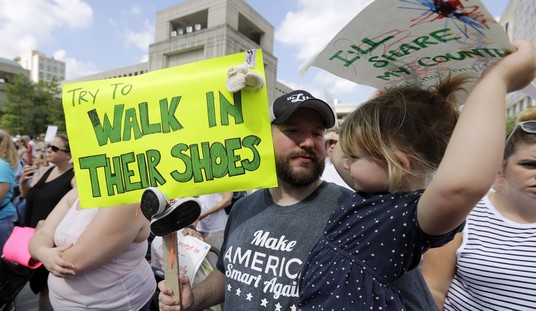With the passage of a $1.1 trillion spending bill that fails to defund President Obama’s immigration amnesty plan (as promised), it seems many Republicans still believe in Beltway fairy tales. If President Obama had shut down the government by vetoing an appropriations bill that didn’t fund the president’s amnesty plan, so the fairy tale goes, Republicans would be blamed and damaged politically.
There’s just one problem with this fairy tale: the 2014 election results.
Nobody blamed Republicans for a shutdown in 2013, and nobody cared. The Washington establishment fears big bad shutdowns because they illustrate to the rest of the country that they can get along just fine without Washington.
I never saw a United States Park Service vehicle until the day I saw federal employees putting up barricades to block parking spaces on the George Washington Parkway during the last government shutdown. It was shutdown theater. Nobody blamed Republicans. Nobody cared.
That’s the real reason the Washington establishment fears a shutdown. Government shutdowns illustrate how inessential Washington is to the lives of ordinary Americans.
As my former Justice Department colleague Hans von Spakovsky pointed out in August 2013 when a similar funding fight over Obamacare was looming, leaders in the House majority were misreading their own party’s political history:
Speaker John Boehner warned that a defunding amendment might lead to a government shutdown and then reportedly reminded the Republicans of the supposed political backlash over the government shutdowns in 1995-96.
Remember 1996? That was when four networks dominated the news cycle and almost nobody used the internet for information. Back then, Matt Drudge was bundling the latest headlines on Usenet to a whopping 50,000 readers.
Even in that obsolete media environment, the shutdown didn’t hurt Republicans, and helped the country. Those 1990s shutdowns resulted from budget fights between Pres. Bill Clinton and Speaker Newt Gingrich, who was trying to bring down the budget deficit, a noble and principled endeavor.
In fact, in the presidential election of 1996 in which voters rejected Republican Bob Dole and reelected Bill Clinton, Republicans only lost eight seats – the first time Republicans had maintained their majority control of the House of Representatives in almost 70 years. They actually gained two seats in the Senate in spite of a Democratic presidential incumbent. Better yet, the federal government was restrained by the GOP’s principled stand.
Out of these positive events, a dark fairy tale emerged, one that still haunts the GOP congressional leadership.
We all know what happened a year ago. President Obama and Harry Reid shut down the government for more than two weeks in October when they rejected a Continuing Resolution from the House that would have funded the federal government with the exception of Obamacare. Of course, the term “shutdown” was a misnomer — the majority of federal employees were kept working as “essential” employees. National security operations continued, as did benefit payments, medical care, air traffic control, border protection, law enforcement, and numerous other activities.
Many in the legacy news media blamed Republicans for this shutdown, instead of the obstinacy of President Obama and Harry Reid. It didn’t matter to them that Republican members of Congress had voted sufficient appropriations to keep the entire government running, with only one exception: a healthcare law disliked, despised, and derided by a majority of the American people.
So did the political disaster that many predicted for Republicans as a result of the two-week shutdown and the principled fight on Obamacare occur? To the contrary, it energized the Republican base, while the rest of the country didn’t care.
Rather than losing seats, Republicans gained more House and Senate seats in a wave or near-wave 2014 election. They have taken over the Senate and gained more than a dozen net seats in the House (we are still awaiting the results of a recount in Arizona).
Republicans now hold their largest majority in the House of Representatives since the 1946 election. With nine new Senate seats, Republicans scored the largest gain in a midterm election in decades. And they didn’t just win big in congressional elections, they also made “deep and wide” gains in state legislative seats across the nation. Republicans nearly doubled the number of state Senate seats they hold, and now have a 689-seat advantage in state house seats.
Trying to defund Obamacare didn’t hurt Republicans with voters because the members of Congress were taking a principled stand against something voters don’t like: the president’s signature health care law. Exit polling by the National Election Pool, a consortium of five news networks and the Associated Press, found that after the economy, health care was the second top issue for voters. They disagreed with the Obamacare law by a two to one margin.
If this is what shutdowns bring, bring on the shutdowns!
Seriously though, it should not be anyone’s objective to shut down the federal government. But principled legislators should have tried to defund the implementation of the administration’s unilateral, unconstitutional amnesty plan. The spending bill that was just signed into law by President Obama funds the government through September of next year, but only funds the Department of Homeland Security through Feb. 27. Republicans are pledging to take up the defunding issue then. Will they do it? Or will they be scared off again?
In the meantime, President Obama will have had two and a half months to implement amnesty, making it progressively (pun intended) harder to reverse.
Republican legislators have to stop believing the fairy tale about government shutdowns, spread not only by the Left-wing media, but by insider Republican consultants. Standing on principles that the American people agree with equals good politics, and opposing President Obama on this issue is the only principled stand to take.











Join the conversation as a VIP Member